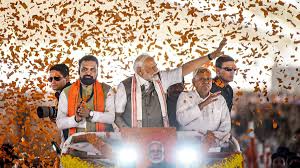PM Modi’s ‘Jungle Raj’ dig at RJD in Bihar: ‘Lalu Yadav, family snatched land from poor people’

Prime Minister Narendra Modi recently launched a sharp attack on the Rashtriya Janata Dal (RJD) leadership. At a rally in Bihar, Modi accused former Chief Minister Lalu Prasad Yadav and his family of grabbing land from poor people. He described the RJD’s rule as ‘Jungle Raj,’ a time marked by lawlessness and exploitation.
What Modi Meant by ‘Jungle Raj’
The term ‘Jungle Raj’ has been used by BJP leaders to criticize the governance during Lalu Yadav’s tenure. It suggests a period of chaos, corruption, and weak law enforcement. Modi linked this phrase directly to the alleged land grabbing by Lalu’s family. He said they used their political power to dispossess poor farmers and landowners. This criticism comes as Bihar prepares for important state elections. Modi’s aim is to remind voters of the alleged failures during the RJD’s rule.
Allegations of Land Grabbing
Modi said Lalu Yadav and his family illegally took land from marginalized communities. In Bihar, land is more than just property — it is the main source of livelihood for millions. Many people live on small farms, so losing land means losing their means to survive. These accusations strike a chord with the rural population, especially those from weaker economic backgrounds.
While Modi did not share detailed proof during the speech, the claims echo long-standing accusations against Lalu and his family. Over the years, they have faced various corruption charges. Critics say the RJD created a system where powerful families could manipulate land records and intimidate small landowners.
What ‘Jungle Raj’ Means for Bihar’s People
In Bihar’s political language, ‘Jungle Raj’ refers to a period of disorder. Many recall the 1990s and early 2000s as years when criminals operated openly and corruption thrived. Governance was weak and law enforcement ineffective. Modi used this term to remind voters of that troubled time. He contrasts it with his government’s promise of better law and order, development, and fairness.
Political Impact Ahead of Elections
Bihar’s politics are highly competitive. The RJD, led by Lalu’s son Tejashwi Yadav, enjoys strong support among certain caste groups and rural voters. Modi’s attack aims to weaken this support by highlighting the past. BJP wants to present itself as the party of progress and justice.
By focusing on corruption and land grabbing during RJD’s rule, Modi hopes to appeal to poor and marginalized voters. RJD leaders, however, have called Modi’s remarks political propaganda. They say the BJP is trying to distract people from its own failures. They also say BJP’s record in Bihar is not beyond criticism.
The Importance of Land Issues in Bihar
Land ownership is a sensitive issue in Bihar. A large part of the population depends on small farms for their livelihood. Many from Scheduled Castes, Scheduled Tribes, and Other Backward Classes have struggled to get legal ownership of land. Allegations of land grabbing by political elites are serious because they deepen economic inequality.
If true, such actions not only harm poor farmers but also increase social tension. Many civil society groups and politicians demand transparent land records and strict laws to protect small owners. Modi’s comments show that land issues still dominate Bihar’s politics.
What Bihar Voters Should Watch For
With the focus on ‘Jungle Raj’ and land grabbing, Bihar’s voters will hear more about governance failures and social justice. These topics will likely influence voter choices. Many rural poor will listen closely to promises about protecting their land and rights.
Voters should carefully consider all claims made by political parties. They should demand clear plans to fix past wrongs. Transparency in land records and strict action against illegal land grabbing must be priorities.
Conclusion
Prime Minister Narendra Modi’s recent remarks accusing Lalu Yadav’s family of land grabbing have reignited political debate in Bihar. Modi used the phrase ‘Jungle Raj’ to remind voters of the lawlessness during RJD’s rule. The BJP aims to weaken the RJD’s influence ahead of elections. Meanwhile, the RJD denies these allegations and calls them political tactics.
Beyond politics, these issues reveal ongoing challenges related to land rights and social justice. Bihar’s voters face a crucial choice. They can demand accountability and reforms to protect the poor and ensure better governance. Only transparent and fair policies can help Bihar move forward and address long-standing inequalities.






